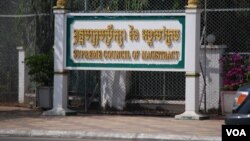PHNOM PENH —
Three judicial reform draft laws will be submitted to the Council of Ministers last this month, justice officials said Wednesday.
The draft laws deal with the functions of the courts and the conduct of judges and prosecutors, as well as an oversight body called the Supreme Council of Magistracy.
Nongovernmental organizations say they worry the laws are being passed without outside review or comment, which could mean they don’t function to clean up a justice system widely criticized for corruption, political bias and ineffectiveness.
However, Sam Procheameanith, a senior official for the Ministry of Justice, told VOA Khmer that the draft laws are undergoing rigorous review through government institutions. Once all three are finished at the Ministry of Justice, they will be moved to the Council of Ministers, he said.
After approval at the Council of Ministers, the drafts will be sent to the National Assembly for debate and approval. However, the Assembly is still not fully functioning, with the opposition Cambodia National Rescue Party continuing a post-election boycott of parliament.
Yim Sovann, a spokesman for the Rescue Party, said the drafts can’t be considered until “all parties” debate them at the Assembly.
Meanwhile, critics of the laws say they are not likely to be implemented properly.
“The current situation leads to doubts of the validity of their being enforced by law,” said Moeun Tola, head of the labor program at the Community Legal Education Center.
The draft laws deal with the functions of the courts and the conduct of judges and prosecutors, as well as an oversight body called the Supreme Council of Magistracy.
Nongovernmental organizations say they worry the laws are being passed without outside review or comment, which could mean they don’t function to clean up a justice system widely criticized for corruption, political bias and ineffectiveness.
However, Sam Procheameanith, a senior official for the Ministry of Justice, told VOA Khmer that the draft laws are undergoing rigorous review through government institutions. Once all three are finished at the Ministry of Justice, they will be moved to the Council of Ministers, he said.
After approval at the Council of Ministers, the drafts will be sent to the National Assembly for debate and approval. However, the Assembly is still not fully functioning, with the opposition Cambodia National Rescue Party continuing a post-election boycott of parliament.
Yim Sovann, a spokesman for the Rescue Party, said the drafts can’t be considered until “all parties” debate them at the Assembly.
Meanwhile, critics of the laws say they are not likely to be implemented properly.
“The current situation leads to doubts of the validity of their being enforced by law,” said Moeun Tola, head of the labor program at the Community Legal Education Center.






